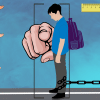On the nuances of discipline

As someone who has never thrived with a routine, I have always found it difficult to maintain "discipline" for myself. The most concrete parts of my daily life involve doing the basic tasks. Making sure to eat three times a day, and not burning myself out by sacrificing rest for work. Discipline, for me, is about prioritising my mental health, and trying to fulfil the goals that I have set to the best of my abilities.
However, discipline doesn't look the same for everyone. To explore these different perspectives, I asked some of my peers what discipline means for them.
For Taseen Dhrubo Bakht, a student of 12th grade from a reputed school in Dhaka, routine is the most important factor in managing his huge workload of six A level subjects on top of applications. "I feel absolutely out of place without a pre-planned set of events for the day," he shared. "Oftentimes, I find myself very energised and motivated, and finish a lot of workload efficiently with unwavering discipline. In contrast, sometimes I feel very disoriented and like to save things for later."
On the other hand, for Shaila Amin*, an AS level student at Maple Leaf International School, discipline involves a more holistic balance. "Getting out of bed early, doing what needs to get done, maintaining a balance between needs and wants, and making conscious choices that affect my mental and physical health would be the sort of discipline I seek in my day-to-day life. Even though I have been trying for a long time, I haven't learned to implement it yet."
Discipline rarely comes easy, and each person faces a different challenge when trying to find what works for them. For Taseen, fatigue and tiredness are issues he faces due to his intense workload. Shaila's journey, however, has been a difficult one in terms of managing her habits in addition to the pressure it exerts on her mental health.
Nabeeha Umama Khan, a student of 11th grade from a renowned English medium school, juggles the difficulty of managing her day-to-day discipline with the added pressure of her parents' expectations. "I definitely have felt pressured to adapt to a more disciplined routine by my parents, like with their preferred sleep schedule. Starting to have a more disciplined lifestyle itself is a challenge, and the biggest challenge for me has been trying to keep up my progress, which I still haven't managed to figure out."
In my experience, it is very easy to end up at harmful extremes of the spectrum of discipline. Pushing oneself to be disciplined in a harmful way is a problem most face while learning what works for them. Common experiences of dysfunctional practices include pulling all-nighters, skipping meals, overworking, and habitual procrastination. The takeaway here is to look out for our health first. It is much easier to focus on a task while accepting that it's okay not to get everything right immediately.
How discipline is integrated into one's life also varies from person to person. Shaila rewards herself for building up little habits. "I struggle with taking pills of any sort, so for every pill I take, I reward myself with a small portion of delightfully sweet things afterwards. I also have a suncatcher sticker that casts a rainbow in morning sunlight, so I wake up early to see it every day," she said.
Taseen also thrives on positive reinforcement: "I like to keep a close group of friends whom I talk to about every little task I finish. They reciprocate by complimenting me and making me feel good about myself, leading to better self-esteem and the urge to take on more work in my case."
Nabeeha's encouragement is the kind of necessary validation for those who feel alone or dejected about their progress with discipline."It's a very lengthy process. Please do not be too hard on yourself, and instead applaud yourself for the little things you have achieved. The most important thing is to try to love yourself," Nabeeha said.
*Names have been changed upon request for privacy.
Nadera Naeema Ohi is a student at Maple Leaf International School.

 For all latest news, follow The Daily Star's Google News channel.
For all latest news, follow The Daily Star's Google News channel. 









Comments